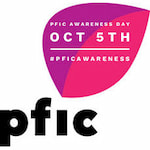PFIC Awareness Day Date in the current year: October 5, 2026
 PFIC Awareness Day is observed annually on October 5. The day was created to educate the public about progressive familial intrahepatic cholestasis (PFIC), a group of genetic disorders characterized by impaired bile flow from the liver to the duodenum.
PFIC Awareness Day is observed annually on October 5. The day was created to educate the public about progressive familial intrahepatic cholestasis (PFIC), a group of genetic disorders characterized by impaired bile flow from the liver to the duodenum.The liver has several biological functions. One is the production of bile, an alkaline fluid that aids in digesting lipids and absorbing fat-soluble vitamins in the small intestine. When digestion is occurring, freshly secreted bile flows through bile ducts to the duodenum. When it is not occurring, the bile is diverted into the gallbladder for storage.
Impaired bile flow results in a condition called cholestasis, which has two types. Obstructive cholestasis is caused by a mechanical blockage of the bile ducts, such as from gallstones or a tumor. Metabolic cholestasis, on the other hand, is caused by genetic or biochemical defects in hepatocyte metabolism rather than by a physical blockage of the bile ducts.
Progressive familial intrahepatic cholestasis (PFIC) is caused by mutations that result in defective transport proteins essential for bile formation and secretion. Due to these mutations, bile acids cannot properly exit hepatocytes into the bile canaliculi, which leads to cholestasis.
There are several subtypes of PFIC, which are classified by the affected gene and the disrupted protein. The three main subtypes are PFIC-1 (Byler’s disease), PFIC-2, and PFIC-3. These subtypes are caused by mutations in the ATP8B1, ABCB11, and ABCB4 genes, respectively. Additional genes associated with PFIC include TJP2, NR1H4, SLC51A, USP53, KIF12, ZFYVE119, MYO5B, SEMA7A, and VPS33B. Some of these genes were recently discovered to be associated with PFIC, so their respective subtypes are less researched.
All subtypes of PFIC share common symptoms, including pruritus (itching), jaundice, a swollen abdomen, dark yellow or brown urine, pale stools, easy bruising or bleeding, poor growth, and deficiencies of fat-soluble vitamins (A, D, E, and K). Onset usually occurs before the age of two, though some patients do not experience noticeable symptoms until adolescence or adulthood.
Diagnostic tests for PFIC include liver function and bile acid tests, a liver biopsy, and genetic testing to confirm the diagnosis and identify the subtype. Some patients are misdiagnosed or go undiagnosed since genetic testing is not universally available.
Like most rare genetic conditions, PFIC is currently incurable, and treatment is primarily supportive. Depending on the type and severity, treatment may include medications to reduce bile acid accumulation, vitamins and/or medium-chain triglyceride (MCT) supplements to prevent deficiencies, and surgery to improve bile flow. Since the disease is progressive, many patients will require a liver transplant.
PFIC Awareness Day, launched in 2019, aims to educate the public about this rare disease, support affected families, and raise funds for further research. You can get involved by learning more about PFIC, sharing what you’ve learned with others, donating to an organization that helps patients or funds research, and spreading the word on social media with the hashtag #PFICAwarenessDay.
- Category
- International Observances
- Tags
- PFIC Awareness Day, international observances, awareness days, rare diseases, progressive familial intrahepatic cholestasis